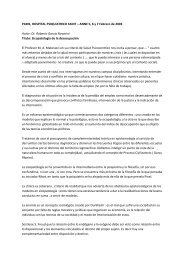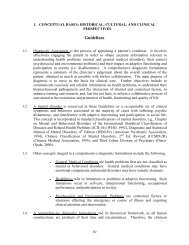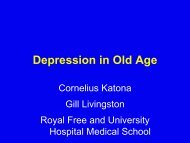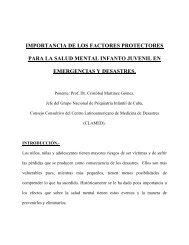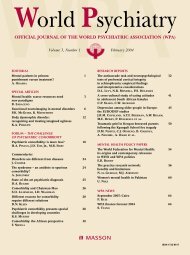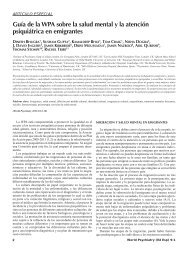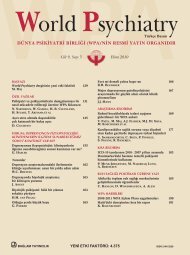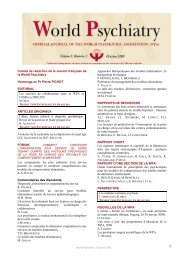ABSTRACTS - World Psychiatric Association
ABSTRACTS - World Psychiatric Association
ABSTRACTS - World Psychiatric Association
You also want an ePaper? Increase the reach of your titles
YUMPU automatically turns print PDFs into web optimized ePapers that Google loves.
1991 in the province of Quebec, Canada. In one of the largest study on<br />
this topic to date, the authors were able to identify a total of 840 consecutive<br />
records of victims who were murdered in the context of familial<br />
or domestic violence. These records were reviewed in detail and<br />
compiled by the same two psychiatrists. The importance of obtaining<br />
a clear understanding of familial homicide is underscored by indications<br />
that a high proportion of those homicides are perpetrated by<br />
individuals who suffer from a major mental illness. Spousal homicide<br />
represented about half of the domestic homicide, followed in frequency<br />
by filicide (22%), parricide (12%) and fratricide (2%). In contrast<br />
to spousal homicide, where a similar proportion of victims died by<br />
firearm or use of a sharp object, and parricide, where the majority of<br />
victims died by sharp object, most victims of filicide (excluding fatal<br />
battering) died by a method that caused minimal injury or pain.<br />
PO3.129.<br />
ETHICAL ISSUES IN PSYCHIATRIC CARE:<br />
AN INDIAN VIEW<br />
A. Mallik, D. Roy<br />
Kothari Medical Centre and Appolo Hospital, Kolkata, India<br />
No area of medicine is so concerned with ethics as the field of psychiatry.<br />
In India, there is a wide variation of caste, creed and religion.<br />
Hence, building a cooperative and trusting relationship with the<br />
patients has always been an essential factor to enable psychiatrists to<br />
foster the healing process. But, in reality, ethics in psychiatry is usually<br />
wrongly stated or assumed in our practice. This is because psychiatry<br />
remains a low priority compared to other branches of medical science<br />
in India. Apathy and ignorance of family members of mental<br />
patients, social stigma, unpredictable prognosis and variable treatment<br />
modalities are the probable reasons. In India, a practicing psychiatrist<br />
has to take more responsibility in management of mental disorders<br />
in spite of workload, criticism by family members or vested<br />
interested people. Harassment by over-enthusiastic patient party,<br />
pseudo-social activists, politicians is inevitable and a practicing psychiatrist<br />
needs careful consideration for such interference.<br />
PO3.130.<br />
DETENTIONS OF OLDER ADULTS IN A SCOTTISH<br />
HEALTH REGION UNDER THE 1984 AND 2003<br />
MENTAL HEALTH LEGISLATION – A COMPARATIVE<br />
STUDY<br />
G. Stevenson<br />
Department of Psychiatry, NHS Fife, Scotland, UK<br />
Mental health detentions in older adults (over 65 years) is an underreported<br />
topic compared to working age adults, but the demographic<br />
shift towards an older population is likely to alter this, and may influence<br />
future mental health service configurations. This study compared<br />
detentions of older adults in a Scottish health region under the previous<br />
1984 legislation to those detained under the current 2003 mental<br />
health legislation. Data were collected prospectively on all older adults<br />
detained in Fife (with a population of 350,000) during a 12 month<br />
period in 1994-1995 under emergency powers of the Mental Health<br />
(Scotland) Act 1984, and for all older adults in the same health region<br />
detained in 2008 under the replacement Mental Health Care & Treatment<br />
(Scotland) Act 2003. The detaining medical practitioners were<br />
interviewed, generally by telephone, following each detention, and a<br />
structured questionnaire was utilised to record demographic information<br />
of detainees, their previous mental health contacts, psychiatric<br />
diagnoses, alcohol and drug usage, self-harming behaviours, violence<br />
towards others, police involvement, and experience of the detaining<br />
practitioner in the use of mental health legislation. Initial results show<br />
a changing pattern of detentions of older adults in this Scottish health<br />
region. Reasons for this are proposed and discussed in view of the<br />
changes in Scottish mental health legislation.<br />
PO3.131.<br />
AN EVALUATION OF MENTAL STATUS OF STAFF<br />
IN A TURKISH PRISON<br />
G. Özgür, L. Baysan Arabacı, S. Yıldırım, S. Bozkurt,<br />
N. Gördeles Beşer<br />
Ege Üniversitesi Hemşirelik Yüksek Okulu, İzmir; Niğde<br />
Üniversitesi Zübeyde Hanım Sağlık Yüksekokulu, Niğde, Turkey<br />
This research was made to evaluate mental status of staff in a Turkish<br />
prison. Thirty-three prison staff accepted to be included in the study.<br />
Data were collected by an ad-hoc form and the SCL-90-R. The mean<br />
age of staff was 42.5±4.5 years; 93.9% of them were male; all of them<br />
were married; 54.5% of them were graduated from high school. The<br />
mean Global Severity Index score was 0.7±.0.6. The level of distress<br />
was higher in those whose age was 40 or higher, who were graduated<br />
from high school, who worked 48 hours per week, who had been<br />
working in a prison 20 years or more. The higher scores were found<br />
on the subscale anger (1.1±0.9), obsessive-compulsive (0.9±0.6), somatization<br />
(0.9±0.8), paranoid thinking (0.8±0.7) interpersonal sensitivity<br />
(0.7±0.7).<br />
PO3.132.<br />
FIRST-EVER ADMITTED PSYCHIATRIC INPATIENTS:<br />
CLINICAL CHARACTERISTICS AND REASONS<br />
CONTRIBUTING TO ADMISSION<br />
G. de Girolamo, F. Guzzetta, R. Miglio, G. Santone, A. Picardi,<br />
B. Norcio, R. Bracco, for the PROGRES-Acute group<br />
Health Care Research Agency, Emilia-Romagna Region, Bologna;<br />
Department of Mental Health, Local Health Unit of Cesena;<br />
Department of Statistics, University of Bologna; United Hospitals<br />
of Ancona and Polytechnic University of Marche, <strong>Psychiatric</strong><br />
Clinic, Ancona; Mental Health Unit, Center of Epidemiology,<br />
Surveillance and Health Promotion, National Institute of Health,<br />
Rome; Department of Mental Health, Local Health Unit,<br />
Trieste, Italy<br />
First admission to a psychiatric facility represents a major personal<br />
event for patients and their families, as well as a very expensive form<br />
of psychiatric treatment. Aim of this study is to describe socio-demographic<br />
and clinical characteristics of first-ever admitted patients and<br />
to identify reasons contributing to admission. Data were obtained<br />
from a national survey carried out in Italy in public (n=130) and private<br />
(n=36) facilities admitting acute psychiatric patients (PRO-<br />
GRES-Acute). Cluster analysis was used in order to identify homogeneous<br />
patients’ groups. Three-hundred thirty-seven patients were at<br />
their first admission. Median age at admission was 40; about 46% of<br />
subjects were not receiving any treatment in the month preceding<br />
admission. Social/work functioning problems, social withdrawal and<br />
conflict with family members were the most common reasons contributing<br />
to admission. Cluster analysis identified four patient groups<br />
with notably different socio-demographic and clinical characteristics.<br />
First admitted patients represent a highly heterogeneous group of<br />
patients. Early intervention research should consider this sociodemographic<br />
and clinical variety in order to better allocate resources<br />
and develop special intervention programmes.<br />
283




